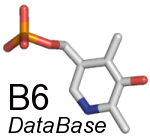|
|
| |
2.8.5.1 |
| Description |
S-sulfo-L-cysteine synthase (3-phospho-L-serine-dependent) |
| Alternative names |
cysK2 (gene name) |
| Catalyzed reaction |
O-phospho-L-serine + thiosulfate = S-sulfo-L-cysteine + phosphate |
| Cofactor |
Pyridoxal phosphate |
| Comments |
The enzyme, which has been characterized from the bacterium Mycobacterium tuberculosis, has no activity with O-acetyl-L-serine. Requires pyridoxal 5'-phosphate. cf. EC 2.5.1.144, S-sulfo-L-cysteine synthase (O-acetyl-L-serine-dependent). |
| |
Mycobacterial CysK2 provides an alternative metabolic rout to cysteine, either directly using sulfide as donor or indirectly via S-sulfocysteine.
Mycobacterium tubercolosis infects macrophages evading the bacterial action of immune cells. S-sulfocysteine could also acts as a signaling molecule triggering additional responses in redox defense upon exposure to reactive oxygen species. |
| Organisms |
-Eubacteria |
| | |
|---|
Family |
|
| | |
|---|
| Links |
Enzyme (activities) 2.8.5.1
BRENDA (activities) 2.8.5.1
KEGG (pathways) 2.8.5.1
PLPMDB (PLP mutants) 2.8.5.1
|
| | |
|---|
| References |
Articles on 2.8.5.1 |
| | |
|---|
| last changed |
2018/06/04 11:54 |
|











